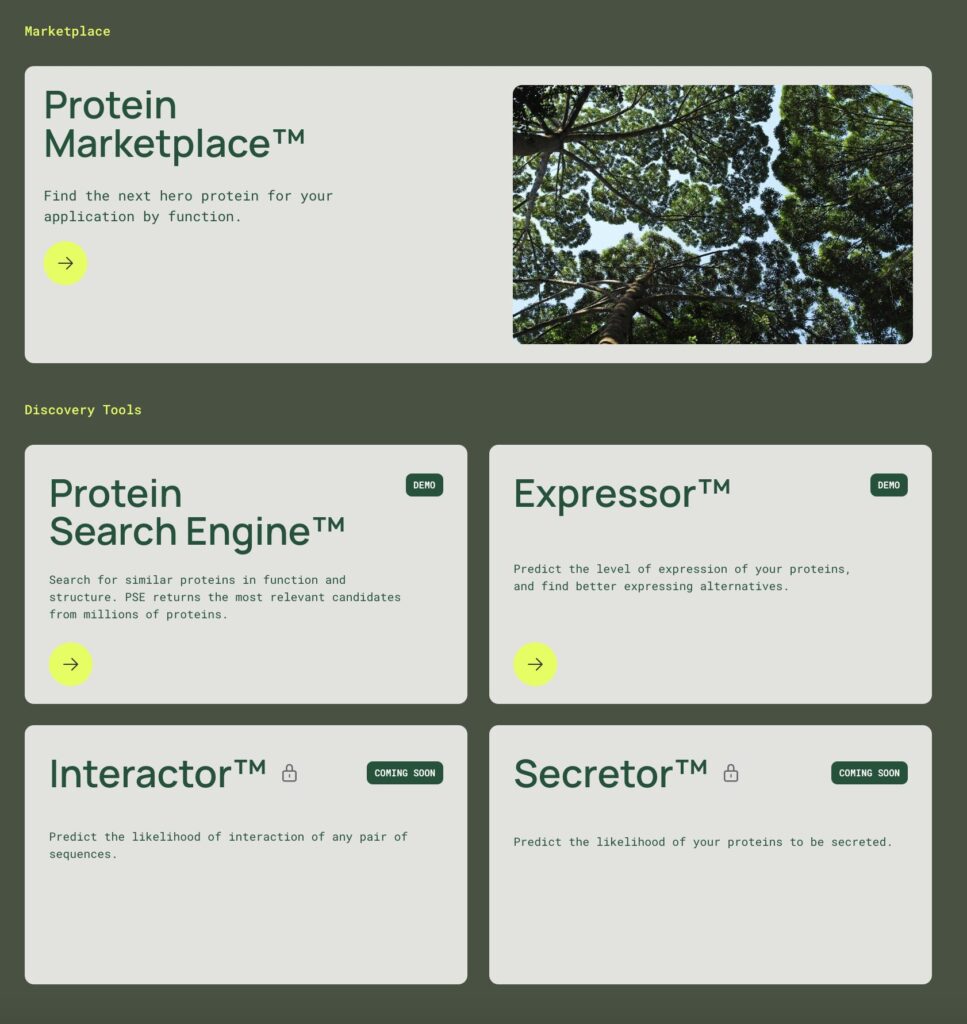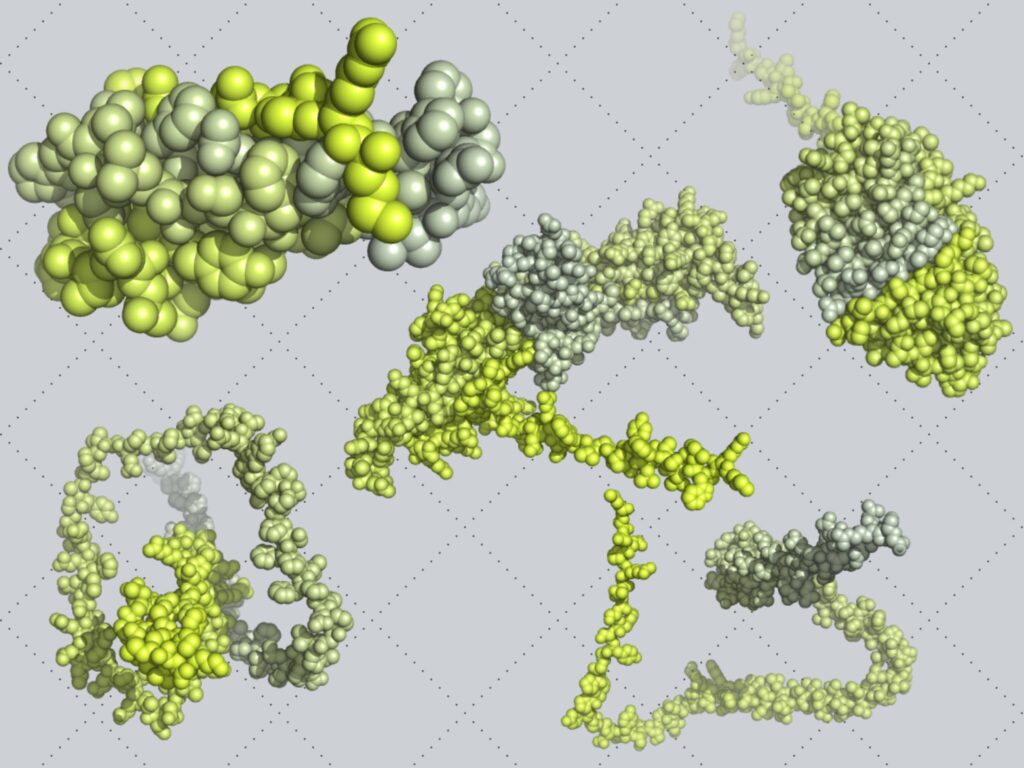4 Mins Read
Artificial intelligence startup Shiru has today launched the “world’s first” protein discovery platform, allowing companies to find and buy sustainable proteins for product development.
As the world of protein expands, with innovators sourcing it from seaweed, plant cells and even thin air, discovering the right protein formulation for new products can be a minefield. If only there was a website that could do that – and better yet, what if you could buy the perfect protein you’ve found?
Well, you can now, thanks to ProteinDiscovery.ai, an artificial-intelligence-led protein marketplace developed by Shiru, the Californian food tech startup behind the plant-protein-based OleoPro fat.
The website allows companies to search, discover, pilot, and buy molecules for applications ranging from food and agriculture to personal care and advanced materials. Described as an industry-first, it harnesses the power of AI and combines it with an extensive database of natural protein sequences, and automated biochemistry workflows to deliver a web interface that lets you search through over 33 million molecules.
“For the first time ever, ProteinDiscovery.ai will enable the direct purchase of functional, novel proteins via an easy-to-use e-commerce interface,” says Shiru founder and CEO Jasmin Hume. “These are research-grade samples of pure proteins, delivered in aqueous solution.”
‘Amazon for proteins’

Shiru has itself been using AI to identify high-value, scalable novel proteins for years, which led to the launch of its OleoPro ingredient, a blend of plant proteins and unsaturated oils that mimics animal fats for plant-based meat, dairy and cosmetics applications.
But after garnering interest from CPG companies and ingredient manufacturers, it decided to open its toolbox to the world. ProteinDiscovery.ai catalogues the proteins by sequence, metadata, functional use, performance and successful expression, with a search engine presenting the most relevant results a customer is looking for. It has tools to predict the level of expression and find better alternatives, forecast the likelihood of interaction between any pair of sequences, and estimate how likely it is for your proteins to be secreted.
The tool links natural protein sequences with novel applications to create new intellectual property of derisked bio-based ingredients at breakneck speeds, saving companies millions of dollars and years of work in R&D. Looking for plant-derived casein mimics? Clean-label methylcellulose substitutes? Highly stable sweet proteins? Potent, non-toxic biopesticides? The ProteinDiscovery.ai platform has it all, really.
How does it work? “Users can leverage our marketplace features as well as our discovery tools to search our catalogue for proteins with specific functionalities, predict protein expression, and search for proteins with similar functionalities that come from unexpected organisms,” explains Hume, who calls it an “Amazon for proteins”.
“The site is extremely easy to use and is designed for simplicity. Ordering a protein sample is as easy as finding a product of interest on Amazon. Once the user locates a protein of interest, they can purchase a sample through a familiar e-commerce flow,” she adds.
Shiru lets companies licence proteins

In the ingredients world, patents, licences and regulations play a decisive role. Shiru knows that, and the ProteinDiscovery.ai platform allows companies to both buy samples of a protein and secure the IP rights either exclusively or non-exclusively.
“One protein sequence can be bought by multiple companies,” says Hume. “We are really excited about the competition that arises in a true ‘marketplace’ – something that has been very hard to achieve through traditional, confidentiality-cloaked business development of licensing IP.”
She notes that the default license customers can purchase will be non-exclusive, making Shiru’s proteins available to any business. “If a company decides they’d like exclusive access to the IP for a specific protein, Shiru will engage in these negotiations on a case-by-case basis.”
With any novel proteins, companies are required to obtain authorisation from regulatory bodies in their respective markets. The proteins available on Shiru’s marketplace are research-grade and available solely for R&D and non-commercial use across their breadth of industry applications.
“The samples are not intended for consumption,” outlines Hume. “These are novel proteins offering major potential solutions and functionality. However, it is up to each individual company to own the product development and resulting regulatory approval process. Shiru and our partners are supplying the proteins.”
All the protein samples are priced at a flat fee of $1,500 for a 10mg sample. Larger samples are available on request. “Target partners for our digital tools are innovators across those industries, both those developing newly formulated products with protein ingredients and those creating new ingredients,” says Hume.
When asked about the business model, the Shiru CEO adds: “ProteinDiscovery.ai is the gateway for Shiru’s digital search offerings and tools, which generate revenue through access to our platform.”
The company has already partnered with industry giants like Puratos and Griffiths Foods to discover, test and scale ingredients for egg and meat alternatives, respectively, through AI. Although the tech has its climate problems, its use in food applications has been exploding recently, with Chile’s NotCo, California’s Climax Foods and Singapore’s Howw Foods all leveraging AI to find the most suitable formulations for alternative protein products. Last month, the Bezos Earth Fund announced a $100M grant for AI-based nature solutions, including future foods.




